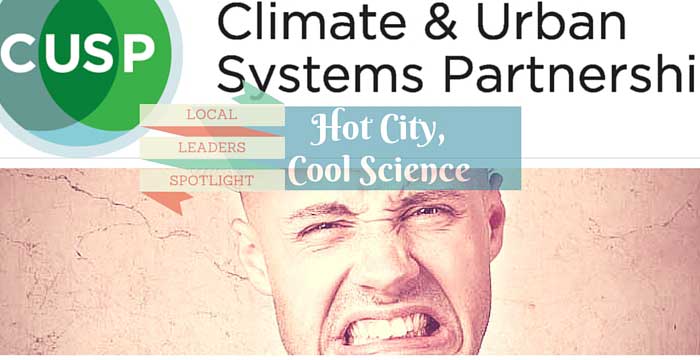
3 Reasons Why Your Brain is Wired to Ignore Climate Change
(Or Psychology of Climate Change)
Post by Dr. Raluca Ellis for CUSP. Raluca Ellis is the Environmental Scientist for The Franklin Institute and Program Director of the Climate & Urban Systems Partnership. Her expertise is in communicating complex topics such as climate change to general audiences. She holds a doctoral degree in environmental chemistry and was a postdoctoral fellow at Harvard University.
When I was starting out in my grad studies in atmospheric chemistry, I learned about this thing called climate change. Humans are changing the composition of the atmosphere by burning fossil fuels, which release heat-trapping gases like carbon dioxide, and other problematic chemicals. It was one of the things that drew me to atmospheric chemistry, because there was a direct societal impact of the science I was studying.
I thought “Whoa!”, that’s crazy. I bet not many people know about this. I bet if I told people about it, and show them graphs (lots of graphs!), and describe the consequences in gory detail, they’ll care too. Boy, was I wrong!
Turns out when it comes to climate change, our brains seem to be wired to ignore the scientific evidence. Social psychologists have been studying this for a while now and have interesting reasons why.
3 reasons why your brain is wired to ignore Climate CHange:
- Future discounting. Humans are pretty bad at long-term planning. Economists, dieticians, and anyone who’s tried to get their dads to quit smoking can tell you that. Climate change moves slowly, and while impacts are being felt here and now in hotter days and wetter weather, people still perceive it as distant in time and space.
- Motivated reasoning. We’d like to think we’re rational creatures, weighing evidence and making decisions based on facts, but we’re not. Humans are highly emotional, social beings that seek out information that confirms what they already believe. That’s why Fox News continues to have viewers.
- Emotional numbing. Ok, let’s face it. Climate change is pretty depressing. Mass extinctions, human displacement, extreme heat waves, more intense hurricanes. It’s a lot to take in. So we just tune out. I call this the Sarah McLachlan Effect. You know you change the channel when that song comes on too! (Editors note: But the puppies!)
So what to do about all this?
Well, we have good news. Awareness is half the battle – and you made it through the article this far. And you can learn more about the psychology of climate change from this handy climate change communication guide.
CUSP has been using what we have learned from social psychology to create climate change education programs that counteract those more negative reactions. Our approach of keeping information local, relevant and solutions-focused is in line with the latest learning research and science communication research.
As a first step, you can learn about climate impacts in Philadelphia and submit a “swelfie” to our Sweatuation campaign to show that you too, care about this (and you know, win a bike).
Go out there and talk to your friends. they probably care about this too. But just don’t talk to your friends with Sarah McLachlan playing in the background.





